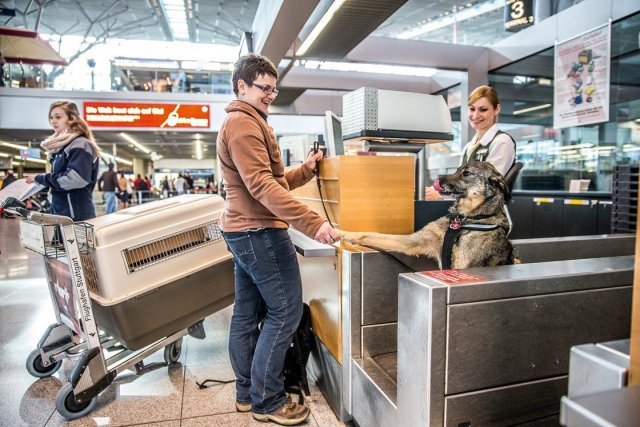USAG Stuttgart Public Affairs
Finding a veterinary care provider

Service members, Department of Defense civilians, and family members are authorized to bring their pets to the Stuttgart Veterinary Clinic. The clinic offers space-available routine annual exams and related services, along with limited dental and surgical procedures. However, it is not an emergency clinic, nor same-day-service provider. The Clinic’s primary mission is to serve as medical support for the dogs of the 100th MWD Detachment.
Regardless if dog owners use the on-base clinic or choose to use host nation veterinary clinics, owners need to register their dog either with the American clinic or with the local Rathaus or city hall.
All dogs in Germany should be up-to-date on their vaccines, most importantly their rabies vaccine. It is also expected that all dogs are microchipped. A good flea and tick medication is also necessary in the Stuttgart area, especially if owners plan to walk through fields and woods.
Pet owners can find several great clinics in the Stuttgart area, including 24-hour emergency facilities, specialty hospitals where pets can receive advanced diagnostic and surgical care, and some excellent general practice veterinary clinics. Additionally, the EU pet passport can only be obtained by an EU veterinarian at a host nation clinic. Many German veterinarians speak English, so there is no need to worry about a language barrier disrupting a pet’s medical care, and many also accept the VAT form.
In addition to veterinary clinics, Stuttgart also has a good selection of boarding facilities, pet stores, and dog groomers. The “Pups of Stuttgart” private Facebook group can be a valuable source of information for those living in the community with dogs.
Know the Rules
Living with pets in Germany can be a rewarding experience, as many local businesses allow well-behaved dogs inside their establishments. However, there are some laws governing animal ownership that might be new to people coming from the U.S. In Germany, it is technically illegal to leave a dog alone for more than five hours. This means anyone working an 8 hour day should plan for someone to come by and let their dog out in between. On the other hand, it is also illegal to keep the dog outside all day. Dogs should also not be kept solely on balconies or in bathrooms or basements. Excessive barking (more than 10 minutes straight), especially during quiet hours, can also be fined. And as shock collars are illegal, a dog trainer may need to be engaged if a dog has a barking problem.
It is important for American personnel to understand that, traditionally, pets in Germany undergo extensive obedience training. Pets are often expected to be as self-disciplined and quiet as a very well-behaved child, and an out-of-control pet is looked down upon in Germany.
Additionally, leash laws and other pet-related ordinances in Germany can be more extensive and vary from town-to-town or county-to-county. Unless a dog is exceptionally well trained, he or she should stay on the leash at all times. While walking outside of public places and housing areas, dogs are allowed off the leash (i.e. in fields or while walking in the woods), but dogs should immediately be put on the leash or called to hand when passing others.
Owners need to pick up after their pets when in public spaces. Some parks and walking trails will have dispensaries for bags, but owners should be in the habit of supplying their own. Failing to pick up after a pet, especially in areas where people walk and where children play can result in a fine.
Germans are also required to have liability insurance for their pets. Owners might also want to register dogs and cats with TASSO as an extra safety precaution. It’s free, and can help find a lost pet (via the required microchip) if they loose accidentally. It’s also required to buckle or secure a dog while driving. This means having a doggy harness and buckle combo, a car-crate, or a backseat barrier. While this law isn’t largely enforced, it does keep pet passengers safe.
Certain breeds (for example, American Staffordshire terriers and bull terriers) are completely banned from entering Germany, and those attempting to import them can be fined or imprisoned while the animal can be deported or seized. Other breeds are restricted, meaning that they are permitted to be in Germany, but special precautions could be required, such as the dog wearing a muzzle when in public, undergoing temperament evaluation, or the owner may be required to take out a special liability insurance policy on the pet. The list of breeds varies by city and state, so owners are encouraged to contact their local German town halls for additional information.
Traveling with a pet
Pet owners looking to travel with their pet while in Europe may be surprised to find just how easy and fun it can be. Within the European Union, an EU pet passport has been established that contains the pet’s vaccination records. As long as the vaccines are up-to-date and it contains all the necessary information, this passport allows the pet to move with the owner within most nations of the EU with ease. EU pet passports are highly recommended as they greatly simplify the vacation travel process and help alleviate stress. A pet passport can only be obtained by an EU veterinarian at a host nation clinic. The official blue EU pet passport (with EU logo) should not be confused with the various other unofficial or country-specific pet passports that many clinics may also carry.
Click here for a dedicated article on PCSing with pets to and from Stuttgart

